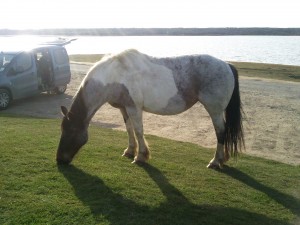Choosing Your First Horse: A Beginner’s Guide
 Today, Eileen Childs – one of our guest authors, gives an insight on how to choose your first horse.
Today, Eileen Childs – one of our guest authors, gives an insight on how to choose your first horse.
Horses For Beginners – Your First Horse
By Eileen Childs
If you are interested in learning more about horses for beginners or are looking for your first horse, then this article is for you. This article discusses the types of things you should look for when looking for a beginners horse.
Time dedication
Horses require a lot of maintenance. If you think you can just turn your horse out to grass in a field and not worry about it, you are wrong. Horses need to have their feet trimmed and may need shoeing depending on the amount of work they do. Like people, they need to have exercise, or they can get out of shape and grow fat. Some horses can eat so much that that they founder, which means their feet hurt so much they are unable to walk. Horses that have a tendency to gain weight should wear a grazing muzzle when turned out to grass, to prevent overeating. Ponies are especially prone to founder. Horses need to be checked every day to make sure they are not sick or injured. If you board your horse at a boarding facility, your horse is usually checked each day, which helps if you can’t always be there to do it yourself.
Your Ability
The horse’s amount of training and your ability are a big consideration when looking for a horse for beginners. If you have no riding experience, it is best to get a well trained quiet horse. These horses are sometimes called schoolmasters. This means they know their job. They are good horses for beginners to learn on, especially if you find one that is very forgiving. A horse with this type of temperament is easy going and doesn’t get upset when beginners do things wrong.
Your Finances
There are a wide range of prices related to horses. Fancy, flashy show horses can cost thousands of dollars, whereas horses that are less fancy can be more moderately priced. The amount of training a horse has can also affect its price. For example, if a horse is young and has a little bit of training, it will not cost a lot. Unfortunately, horses with little training are not good beginners horses. A horse that is between 6 – 8 years old and has good training is usually more expensive. These horses are in their prime. A horse that is over the age of 10 or 12 years old usually is well trained, but health and the condition of the horse’s joints is a consideration. It is not uncommon for older horses to have arthritis. Older horses are usually great beginner horses, but they may have more associated vet expenses due to their age.
Choosing Your Horse
It is advantageous to have someone experienced go with you when you are choosing your first horse. It is best if you have a trainer, who will not only give you lessons after you buy a horse, but help you choose a horse that will be well suited to you. Before buying a horse, you should also have it examined by an equine veterinarian. This is an very important step that you don’t want to skip! The cost of the vet check will depend on how thorough the examination is and how many tests you have done. Your vet can tell you what your options are, but it is always a good idea to get x-rays of the horses legs and joints. It is not uncommon to find something wrong with just about any horse during a vet check, but it is up to you to decide what you are willing to live with. For example, you may not care that a horse has arthritis in his hocks and cannot jump, if you are only going to use it for trail riding.
Buying vs. Leasing
You don’t always have to buy a horse. You also have the option of leasing one. There are a lot of different lease arrangements available including half leases and free leases. With a free lease, you don’t have to pay the owner to use the horse. In this arrangement you are responsible for the horse’s care and living arrangements. With a half lease you may use the horse a few days a week, while the owner or someone else uses the horse the other part of the week. If you do decide to a lease a horse, make sure you have a written agreement, so you know who is responsible for all of the expenses related to the horse, like vet or farrier (blacksmith) bills.
As you can see, there is a lot to consider when getting your first horse. Before you jump into a purchase or a lease arrangement, make sure you do a lot of research first, so you get a horse that is well suited to your individual needs.
For more helpful horse related information, including horse grooming equipment [http://www.beginners-guide-to-horses.com/how_to_groom_a_horse__steps_to_grooming_a_horse.html], visit http://www.beginners-guide-to-horses.com
Article Source: http://EzineArticles.com/?expert=Eileen_Childs
http://EzineArticles.com/?Horses-For-Beginners—Your-First-Horse&id=1560409
Thank you Eileen. Remember never buy a hors that’s ill because you feel sorry for it – this will only cause problems, expenses and possibly heartbreak in the near future.
 December 2, 2010
В·
December 2, 2010
В·  Maddia (Admin) В·
Maddia (Admin) В·  Comments Closed
Comments Closed
 Tags: choosing horses, first horse, how to choose a horse В· Posted in: Horse and Pony Care, Horse and Pony Information
Tags: choosing horses, first horse, how to choose a horse В· Posted in: Horse and Pony Care, Horse and Pony Information


